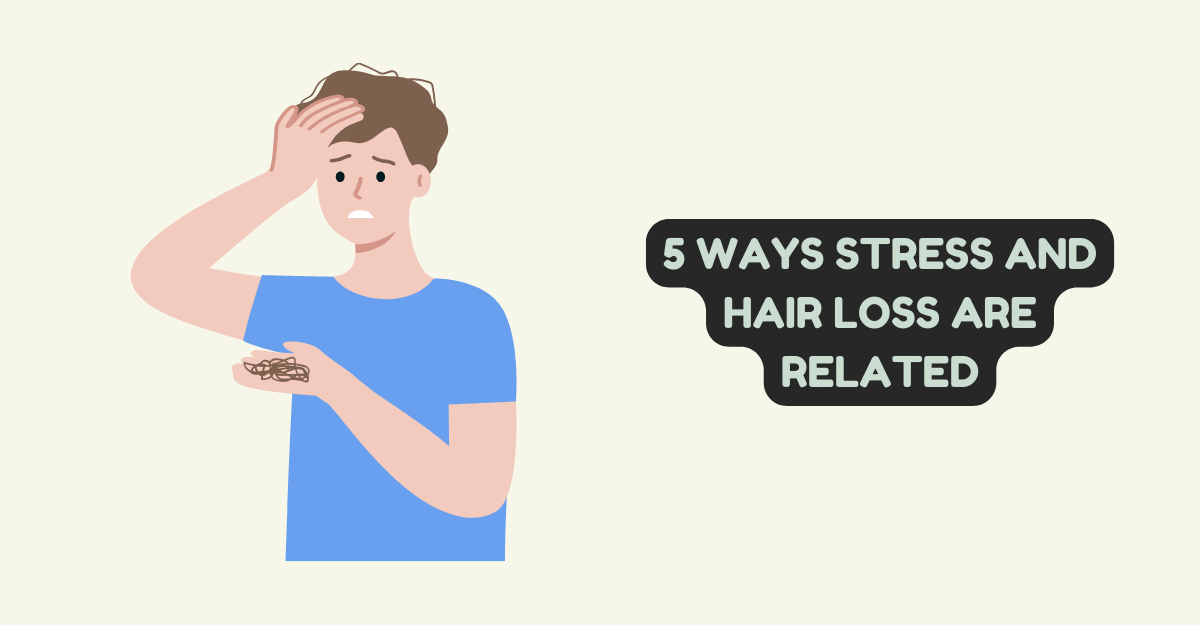
5 Ways Stress and Hair Loss are Related
Stress is an inevitable part of modern life, impacting not just our mental well-being but also our physical health, including our hair. Hair loss, whether gradual or sudden, can be a distressing consequence of chronic stress. Understanding the relationship between stress and hair loss is crucial for effective prevention and management. In this article, we explore five key ways in which stress and hair loss are interconnected, shedding light on the importance of stress management for maintaining healthy hair.
1. Understanding the Hair Growth Cycle
Hair growth occurs in a cycle comprising three main phases: anagen, catagen, and telogen. The anagen phase is the active growth phase, lasting several years and determining the length of hair. The catagen phase is a short transitional phase when hair growth stops. Finally, the telogen phase is the resting phase when old hair is shed to make way for new growth. Stress can disrupt this cycle, pushing more hair into the telogen phase, resulting in increased shedding and potentially leading to hair thinning or loss. It’s important to note that not all hair loss is due to stress; other factors like genetics and medical conditions also play a role.
2. The Impact of Chronic Stress on Hair Health
Chronic stress can significantly impact hair health by affecting the hair growth cycle. One way this occurs is through cortisol, often referred to as the “stress hormone.” High levels of cortisol can disrupt the hair follicle’s normal functioning, causing it to enter the resting phase prematurely. When this happens, hair shedding increases, leading to thinning or even temporary hair loss. Additionally, stress-related habits like pulling or twisting hair can further damage follicles and worsen hair loss. High cortisol levels can also affect the production of hair pigment, leading to premature graying. Managing stress through relaxation techniques, exercise, and a healthy lifestyle can help mitigate these effects.
3. Stress-Related Hair Loss Conditions
Two common stress-related hair loss conditions are telogen effluvium and alopecia areata. Telogen effluvium occurs when a significant stressor pushes a large number of hair follicles into the telogen (resting) phase, causing excessive shedding. This type of hair loss usually occurs a few months after a stressful event and is often temporary, with hair regrowth typically occurring once the stressor is removed. Alopecia areata, on the other hand, is an autoimmune condition where the immune system mistakenly attacks hair follicles, leading to hair loss. Stress is thought to be a triggering factor for this condition, although the exact mechanism is not fully understood
4. Coping Strategies for Stress-Induced Hair Loss
Managing stress is key to preventing further hair loss. Practice stress-relief techniques such as meditation, yoga, or deep breathing exercises. Engaging in regular physical activity can also help reduce stress levels. Ensure you are getting enough sleep, as lack of sleep can contribute to stress. Additionally, maintain a healthy diet rich in vitamins and minerals essential for hair health. Consider seeking support from a therapist or counselor to manage stress more effectively. Remember, taking care of your mental health is just as important as caring for your physical health.
5. Professional Treatment Options for Stress-Related Hair Loss
For those experiencing significant hair loss due to stress, several professional treatment options are available. One such option is scalp micropigmentation, a non-invasive procedure that involves tattooing the scalp to create the appearance of fuller hair. This treatment can be especially beneficial for individuals with thinning hair or bald patches. If this is something you are considering, search online for “scalp micropigmentation near me” to find professionals to help you start your hair recovery journey. Other treatment options include topical medications, such as minoxidil, which can help promote hair growth, and oral medications, such as finasteride, which can help prevent further hair loss. In more severe cases, hair transplant surgery may be considered. It’s important to consult with a dermatologist or hair loss specialist to determine the most appropriate treatment option for your specific needs.
Expert Insights: Managing Stress for Healthy Hair
In understanding the complex relationship between stress and hair loss, it becomes evident that managing stress is key to maintaining a healthy head of hair. By implementing the strategies discussed and seeking appropriate professional guidance, individuals can mitigate the effects of stress on their hair. This holistic approach not only promotes hair health but also contributes to overall well-being. Taking proactive steps to manage stress can ultimately lead to healthier, happier individuals with luscious locks to match.






